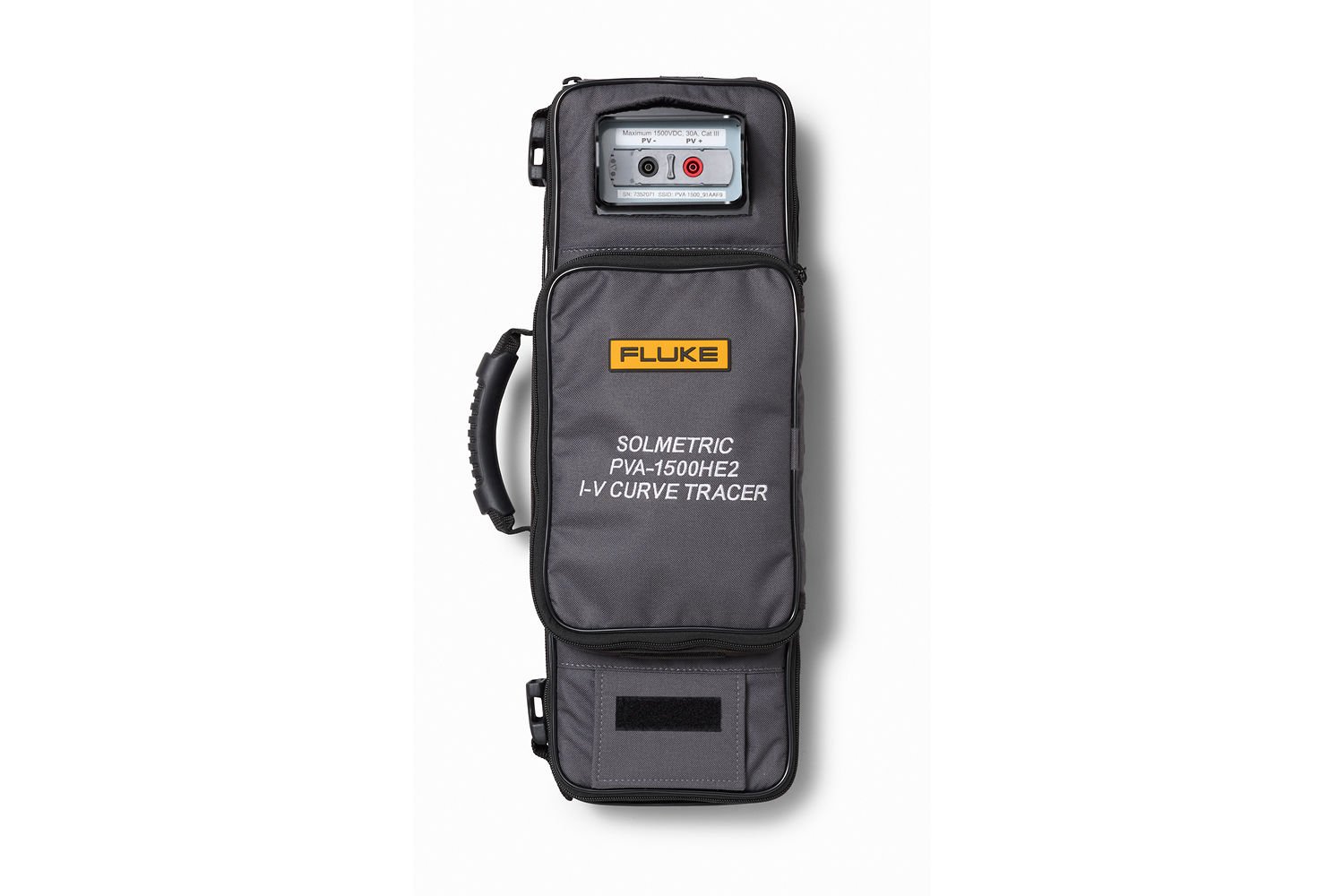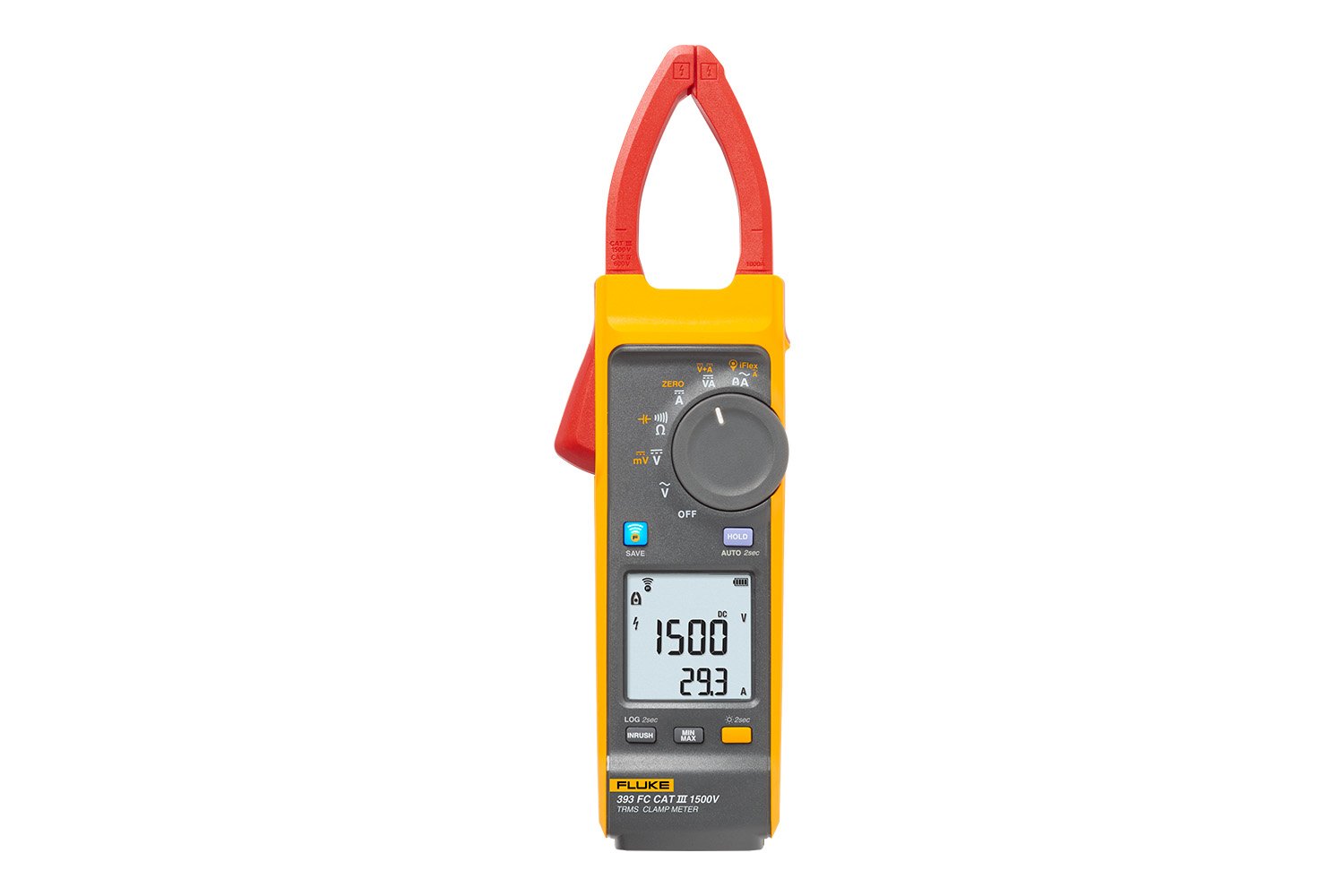Photovoltaic testers and solar PV testing equipment
Get the right solar panel tester and measurement equipment for the job
The growth of the solar energy industry requires new solar testing equipment solutions for electricians, PV installers, and technicians. Fluke offers a range of specialized tools, including solar meters and other critical solar tools, for surveying, installing, maintaining, and reporting on solar installations. Whether you're commissioning a new PV array or performing routine maintenance on a solar farm or photovoltaic power station, Fluke's solar testing equipment has you covered.
PV systems have unique needs that require specialized tools for surveying, installing, maintaining and reporting on solar installations.
Best High-Voltage Solar Tools
Choose the right Fluke solar testing equipment for the job without compromising function or safety.
Fluke GFL-1500 Solar Ground Fault Locator
The Fluke GFL-1500 Solar Ground Fault Locator is a frontline troubleshooting tool that helps...
Fluke 283 FC/PV Solar Digital Multimeter and Wireless Current Clamp
The Fluke 283 FC/PV Solar Digital Multimeter and Wireless Current Clamp, True-RMS CAT III 1500V is...
Fluke 283 FC CAT III 1500V Digital Multimeter
The Fluke 283FC Solar Digital Multimeter, True-RMS CAT III 1500V is ideal for solar power systems,...
PVA-1500 Series PV Analyzer, I-V Curve Tracer
Measure and display I-V curves up to 1500V/30A, with advanced PV modeling, rapid sweeps, wireless ...
SMFT-1000 Solar Tools Kit: Fluke Multifunction PV Tester and Performance Analyzer, I-V Curve Tracer
Designed for PV installation and solar PV testing for systems that operate at 1000 V DC or under.
Fluke Solar Site Survey Irradiance Meter with Mounting Bracket
All-in-one solar irradiance meter ideal for PV installation and maintenance.
Fluke FLK-IRR1-SOL Solar Irradiance Meter
Instantaneous irradiance measurements up to 1400 w/m2. Includes temperature, compass and inclination...
Fluke 393 FC Solar Clamp Meter CAT III 1500 V
Ideal for work outdoors on solar arrays and wind power systems.
Fluke 1587FC Insulation Multimeter
The Fluke 1587 FC Insulation Multimeter is a digital insulation tester and a full-featured, True-RMS...
Fluke Ti480 PRO Infrared Camera
Get a leading-edge visual infrared experience in a professional 640 x 480 thermal imager.
Fluke 87V MAX Digital Multimeter
Rugged, dustproof IP67 outer shell for the most extreme work sites. Measure up to 1000 V ac and dc.
Fluke 1630-2 FC Earth Ground Clamp
The Fluke 1630-2 FC Stakeless Earth Ground Clamp is a heavy-duty clamp jaw that allows you to test...
Fluke 500 Series Battery Analyzer
Ideal for maintenance, troubleshooting and performance testing of individual stationary batteries...
Fluke 64 MAX IR Thermometer
The Fluke 64 MAX thermometer has the precision you need to do your job accurately and will not break...
Fluke 365 Detachable Jaw True RMS AC/DC Clamp Meter
Fluke 365 AC clamp meter has a thin, small jaw with a flexible lead, so gaining access to wires and...
Fluke 1625-2 GEO Earth Ground Tester
The Fluke 1623-2 and 1625-2 GEO Earth Ground Testers offer data storage and download capabilities...
Fluke 1507 Insulation Resistance Tester
Fluke 1507 insulation resistance testers are rugged, compact, reliable & ideal for troubleshooting,...
Fluke insulated long nose pliers
Stay safe and choose Fluke insulated needle nose pliers with side cutter and gripping zones. 8...
Fluke Norma 6000 Series Portable Power Analyzers
Get accurate, precise measurements. Portable, lightweight power analyzer with 10 hours of battery...
Fluke 279 FC True-rms Thermal Multimeter
Full-featured multimeter with integrated thermal imaging designed to increase your productivity and...
Fluke TLPV1 MC4 to 4mm Test Lead Set
Black and red MC4 to 4mm banana plug test leads for safe, reliable solar PV measurements.
Fluke TLPV2 Solar Clamp Test Lead Set, Black/Red
Accurate solar DC measurements with Staubli MC4 connectors for reliable PV system testing.
Fluke a283 FC True-RMS CAT III 1500V Wireless Current Clamp
The Fluke a283FC True-RMS CAT III 1500V Wireless Current Clamp simplifies troubleshooting without...
Pomona PVLEAD3 Solar PV Solar Clamp Test Lead Set
Ideal for use with solar clamp meters that accept 4mm banana plugs.
Fluke Pack30 Professional Tool Backpack
The Fluke Pack30 tool backpack gives you a comfortable hands-free experience vs. traditional tool...
Fluke i410 AC/DC Current Clamp
The Fluke i410 AC/DC Current Clamp expands the functionality of digital multimeters and measures up...
SMFT-1000 Solar Tools Pro Kit: Fluke Multifunction PV Tester, I-V Curve Tracer with TruTest™ Software and Solar PV Leads
All-in-one PV testing solution kit designed for solar installation and inspections.
PVA-1500HE2 I-V Curve Tracer and 1537 Insulation Tester 2500V Kit
Optimize Solar Performance: PVA-1500HE2 PV Analyzer & 1537 Insulation Tester 2500V
PVA-1500HE2 I-V Curve Tracer Thermography Kit
Optimize Solar Performance: PVA-1500HE2 PV Analyzer & TiS75+ Thermal Camera
PVA-1500HE2 I-V Curve Tracer, Clamp and Multimeter Kit
Optimize Solar Performance: PVA-1500HE2 PV Analyzer, 393 FC Clamp Meter & 87V Multimeter
PVA-1500HE2 I-V Curve Tracer, Insulation, Clamp and Multimeter Kit
Optimize Solar Performance: PVA-1500HE2 PV Analyzer, 1587 FC Insulation Multimeter, 393 FC Clamp...
Frequently asked questions for solar tools
What is a solar meter?
A solar meter, also known as a solar irradiance meter or pyranometer, is a device that measures the amount of solar energy or irradiance that is being emitted by the sun. It is commonly used in solar power applications to optimize system performance and ensure that it is operating at peak efficiency. Solar meters can measure solar radiation in units of W/m2, and can accumulate PV yield production and local energy consumption to monitor and analyze PV plant performance. They are also used to measure the efficiency of windows and other solar power devices.
What type of meter do I need for solar power?
For The type of meter you need for solar power will depend on your specific needs. For grid-tied solar systems, a bi-directional utility meter is required to keep track of the electricity that is being transferred to the grid. A PV meter, on the other hand, is used to measure how much electricity your solar system generated. Additionally, a solar irradiance meter or pyranometer can be used to measure the amount of solar radiation that is being received by your solar panels. By using a combination of these meters, you can optimize the performance of your solar power system and ensure that it is operating at peak efficiency. solar power applications, a pyranometer or a solar irradiance meter is typically used to measure the amount of solar radiation that is being received.
What is the difference between a pyranometer and a solar irradiance meter?
A pyranometer measures the total amount of solar radiation across all wavelengths, while a solar irradiance meter measures only the radiation in the visible and near-infrared range.
What are the benefits of using a solar meter?
Using a solar meter can help you optimize the performance of your solar power system, ensure that it is operating at peak efficiency, and detect any issues that may be affecting its performance.
How do I use a solar meter?
To use a solar meter, simply point it at the sun and take a reading of the irradiance level. You can then use this data to calculate the power output of your solar panels.
What is the accuracy of a solar meter?
The accuracy of a solar meter will depend on the specific model and manufacturer. However, most high-quality solar meters have an accuracy of around +/- 5%.
Can I use a regular light meter for solar power applications?
No, a regular light meter is not suitable for solar power applications as it is not designed to measure the high levels of irradiance that are typically found in solar power systems.
What tools do I need for solar power testing?
In addition to a solar meter, you may also need a clamp meter to measure current and voltage, a multimeter to measure resistance and continuity, and a thermal imager to detect hot spots and other anomalies.
What are the best solar energy industry tools?
Some of the best solar energy industry tools include solar irradiance meters, pyranometers, clamp meters, multimeters, and thermal imagers.


































